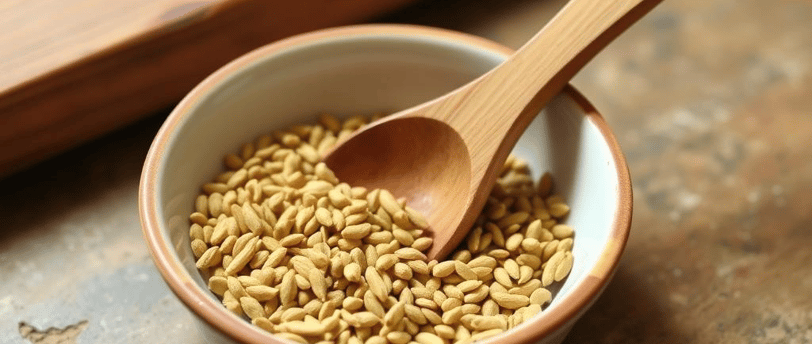Try Fennel Seeds After Meals – A Natural Remedy for Bloating and Indigestion
🧘WELLNESS TIPS🌱 GUT HEALTH & DIGESTION


While digestive discomfort plagues millions, natural remedies are gaining traction as effective alternatives to over-the-counter medications. One such remedy that has stood the test of time is fennel seeds. Often found garnishing Indian meals, these tiny seeds pack a punch when it comes to alleviating bloating, indigestion, and other gastrointestinal woes. This article dives into the scientific evidence supporting the efficacy of fennel seeds, explores their benefits, and suggests ways to incorporate them into your daily routine.
Understanding Bloating and Indigestion
Before delving into the benefits of fennel seeds, it’s essential to understand the concepts of bloating and indigestion. Bloating is a common digestive issue characterized by excessive gas, a feeling of fullness, and a visibly distended abdomen. Indigestion, or dyspepsia, encompasses various symptoms, including upper abdominal pain, discomfort, and an overly full feeling after meals.
Both conditions can be caused by factors such as overeating, consuming gas-producing foods, stress, or underlying health problems. Traditional medicine, as well as modern scientific research, has sought to find effective remedies, bringing fennel seeds into the spotlight.
Fennel Seeds: An Overview
Fennel (Foeniculum vulgare) is a flowering plant species in the carrot family, known for its aromatic properties. The seeds, which are the dried fruits of the fennel plant, have been used in cooking and medicine for centuries. Rich in dietary fiber, vitamins, and antioxidants, fennel seeds have a naturally sweet flavor, often making them a preferred choice for those seeking digestive relief.
Scientific Evidence Supporting Fennel Seeds
Numerous studies underscore the health benefits of fennel seeds, particularly in combating bloating and indigestion. Here’s a look at some key findings that reflect the potency of these tiny seeds.
1. Carminative Properties
Fennel seeds are classified as carminatives—compounds that help reduce gas formation and ease discomfort in the gastrointestinal tract. A study published in the Journal of Ethnopharmacology highlighted the carminative effects of fennel essential oil, emphasizing its ability to decrease gas accumulation and reduce symptoms of bloating.
2. Muscle Relaxation
Apart from reducing gas, fennel seeds exhibit antispasmodic properties, which means they can help to relax the muscles of the gastrointestinal tract. This relaxation can lead to reduced symptoms of indigestion. Research published in Evidence-Based Complementary and Alternative Medicine indicates that fennel can effectively relieve stomach cramps and discomfort, particularly after heavy meals.
3. Antioxidant and Anti-inflammatory Effects
Fennel seeds contain powerful antioxidants, such as flavonoids and phenolic compounds, that combat oxidative stress in the body. One study in the British Journal of Nutrition demonstrated that these antioxidants can help protect against inflammation, potentially alleviating digestive discomfort related to inflammatory digestive disorders.
4. Promotion of Healthy Digestion
The dietary fiber in fennel seeds aids digestion by promoting regular bowel movements and preventing constipation. A study published in Nutrition Journal indicated that a fiber-rich diet contributed to improved digestive health and minimized occurrences of discomfort and bloating.
5. Hormonal Balance and Digestive Health
Interestingly, fennel seeds are thought to enhance hormonal balance, particularly in women. A 2019 study published in the International Journal of Pharmaceutical Sciences and Research found that fennel extract positively influenced hormonal levels, which may indirectly alleviate symptoms of bloating or discomfort related to hormonal imbalances.
How to Incorporate Fennel Seeds into Your Diet
If you struggle with bloating and indigestion, incorporating fennel seeds into your post-meal routine may be beneficial. Here are several methods to consider:
1. Chewing Raw Seeds
One of the simplest ways to enjoy the benefits of fennel seeds is to chew on a teaspoon of the raw seeds after meals. This not only aids digestion but also refreshes your breath.
2. Fennel Tea
Brew fennel seeds in hot water to create a soothing tea. Steeping one teaspoon of crushed seeds in hot water for approximately 10 minutes provides a delightful herbal drink. You can add honey for sweetness or lemon for a zesty twist.
3. Fennel Seed Infused Water
Add a teaspoon of fennel seeds to a jug of water and let it infuse overnight in the refrigerator. Drinking this refreshing water throughout the day can provide continuous digestive benefits.
4. Spice It Up
Incorporate fennel seeds into your meals. They can be used in spice blends, added to soups, or sprinkled over salads for an aromatic twist.
5. Fennel Seed Powder
Grind fennel seeds into a fine powder and mix it with honey or yogurt for a tasty and healthy post-meal snack that calms the digestive system.
Conclusion
Fennel seeds offer a natural remedy for bloating and indigestion, boasting a range of health benefits supported by scientific evidence. Their carminative properties, ability to relax digestive muscles, and antioxidant content collectively contribute to better digestive health. If you're seeking a holistic approach to alleviate post-meal discomfort, consider adding fennel seeds to your culinary repertoire. However, it’s important to consult healthcare professionals, especially if symptoms persist, to rule out underlying medical conditions and tailor a remedy that suits your individual health needs. With their rich history and proven efficacy, fennel seeds may well become your go-to solution for digestive harmony.
